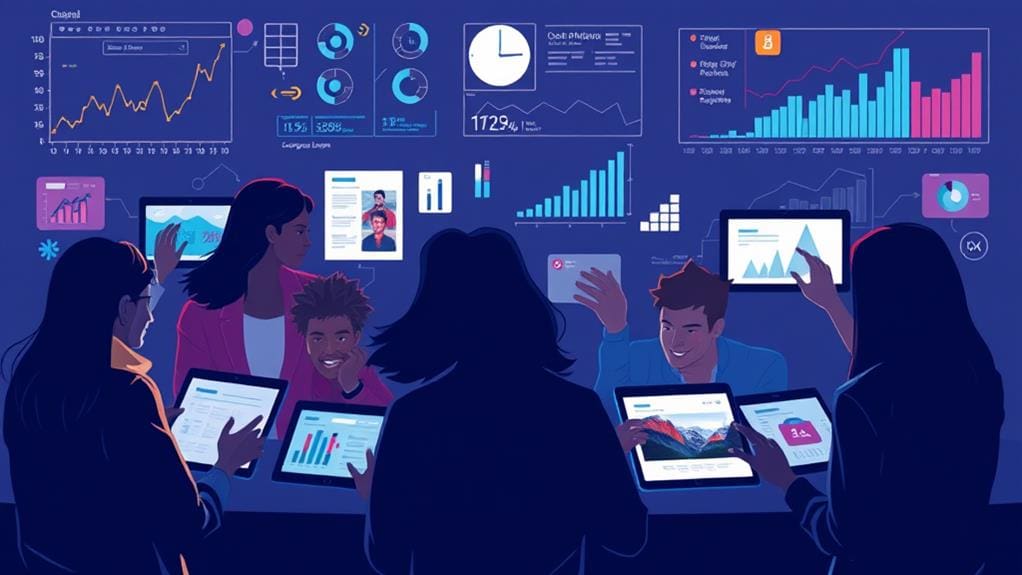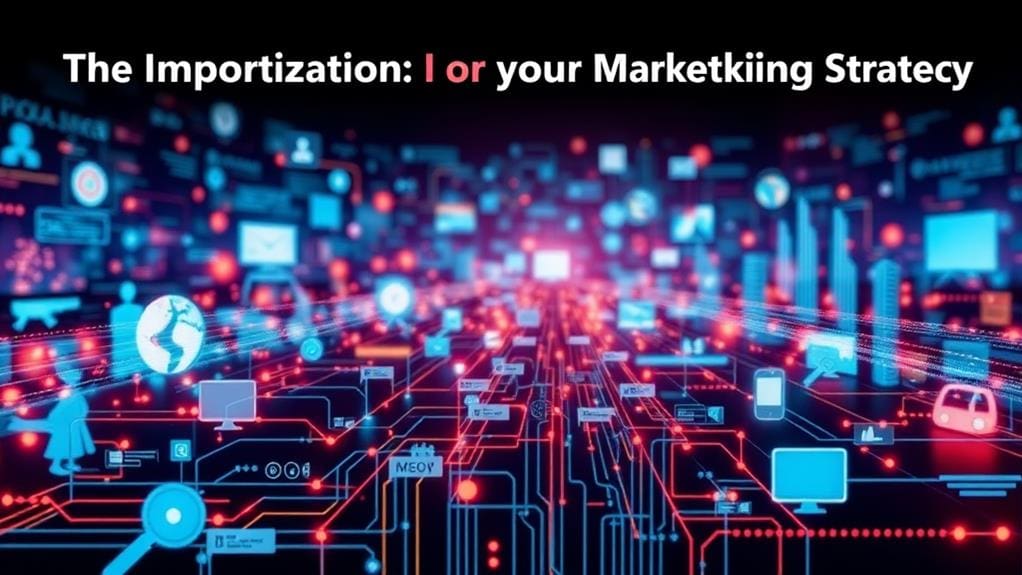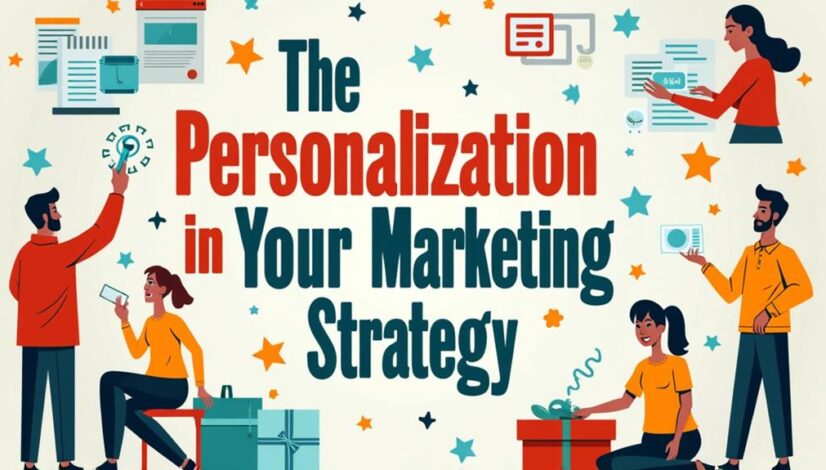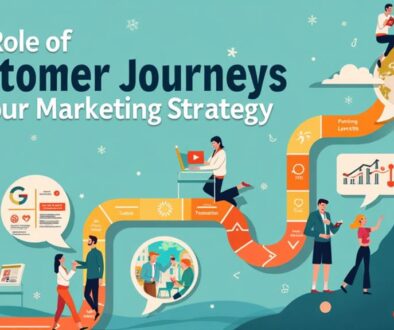The Importance of Personalization in Your Marketing Strategy
Personalization in marketing is essential for creating meaningful connections with consumers. By tailoring strategies to meet individual needs, businesses can greatly boost customer satisfaction and engagement. Techniques such as behavioral segmentation and predictive analytics allow brands to craft targeted messages that resonate with users. This fosters loyalty and enhances the overall customer experience, leading to improved conversion rates. As consumer expectations evolve, brands that prioritize personalization will gain a competitive edge in the marketplace. Uncovering the latest trends and strategies can provide further insights into maximizing your marketing impact.
Key Takeaways
- Personalization tailors marketing strategies to individual customer preferences, enhancing engagement and satisfaction.
- Data-driven techniques like behavioral segmentation and predictive analytics optimize marketing efforts and improve conversion rates.
- Personalized marketing fosters brand loyalty by making customers feel recognized and valued in a saturated market.
- Successful companies, like Amazon and Netflix, demonstrate that personalization can significantly drive sales and user engagement.
- Future trends, including privacy-centric strategies and consumer autonomy, will shape how personalization evolves in marketing.
What Is Personalization?

Personalization in marketing refers to the tailored approach that businesses adopt to meet the specific needs and preferences of individual consumers. This strategy transcends mere demographic segmentation; it explores deeper into understanding customers on a personal level. By leveraging data analytics, companies can glean insights about user behavior, preferences, and purchasing histories, enabling them to craft unique marketing messages and product offerings that resonate with each consumer.
At the heart of personalization lies the optimization of customer experience. This enhanced experience drives user engagement, encouraging consumers to interact with brands on multiple levels. When customers are faced with content that reflects their interests, they are more likely to engage with the brand, whether through social media, email campaigns, or product recommendations. This not only cultivates a sense of belonging and relevance but also fosters loyalty, as consumers increasingly prefer brands that recognize and value their individuality.
Moreover, personalization serves as a catalyst for brand differentiation in an increasingly crowded marketplace. As businesses endeavor to stand out, the ability to deliver personalized content becomes a significant competitive advantage.
However, it is essential to balance personalization with privacy concerns, ensuring that user data is handled ethically and transparently. Ultimately, personalization in marketing is not just about delivering tailored messages; it's about creating meaningful connections that empower consumers and enhance their overall experience with the brand.
Benefits of Personalized Marketing
The advantages of personalized marketing extend far beyond mere customer satisfaction; they fundamentally transform how brands interact with their audiences. By harnessing the power of targeted messaging, companies can create tailored experiences that resonate with individual preferences and behaviors. This level of engagement enhances user satisfaction, fostering a deeper emotional connection between customers and the brand.
Moreover, personalized marketing greatly boosts customer engagement. When messaging reflects the unique interests and needs of consumers, they are more likely to respond positively, leading to increased loyalty. A loyal customer base stems from an enhanced experience that feels relevant and valuable, ensuring that brands remain top of mind.
In terms of conversion rates, the effectiveness of demographic segmentation cannot be overstated. By categorizing audiences based on specific characteristics, brands can deliver content that resonates with each segment, leading to higher rates of successful interactions and purchases. This targeted strategy not only improves immediate sales but also lays the groundwork for long-term relationships, as customers feel recognized and appreciated.
Furthermore, brands that embrace personalized marketing enhance their relevance in an increasingly saturated market. Consumers are inundated with options; therefore, the ability to stand out through individualized experiences is vital.
To conclude, the benefits of personalized marketing encapsulate elevated customer engagement, increased loyalty, enhanced user experiences, and improved conversion rates, all while solidifying brand relevance in a dynamic marketplace. Embracing personalization is no longer a luxury; it is an essential aspect of a thriving marketing strategy.
Data-Driven Personalization Techniques

In today's digital landscape, leveraging data has become paramount for crafting effective personalization techniques in marketing. Brands aiming to connect more meaningfully with their audience can harness data-driven strategies that enhance the customer experience throughout the entire customer journey.
One of the key elements in this approach is behavioral segmentation, which involves analyzing consumer actions to tailor marketing efforts more precisely. By understanding how customers interact with your brand, you can segment them into distinct groups based on their behaviors, preferences, and needs.
Implementing the following data-driven personalization techniques can greatly improve engagement and conversion rates:
- Dynamic Content: Utilize algorithms to adjust website content in real-time, ensuring that every visitor sees offerings tailored specifically to their needs.
- Predictive Analytics: Deploy tools that analyze historical data to anticipate future customer behaviors, allowing proactive engagement.
- Targeted Email Campaigns: Craft personalized email communications using customers' past interactions, ensuring relevance in every message.
- A/B Testing: Regularly test different versions of marketing messages to discover which resonates best with specific customer segments, refining your approach based on data insights.
Case Studies of Successful Personalization
Successful implementation of data-driven personalization techniques not only enhances customer experiences but also yields tangible results, as evidenced by numerous case studies. Companies that prioritize customer segmentation have demonstrated that tailored marketing strategies foster deeper connections and drive sales growth.
One notable example is Amazon. By leveraging sophisticated algorithms for customer segmentation, Amazon personalizes its recommendations based on previous purchases, browsing history, and demographic data. This user experience not only boosts CTR (Click-Through Rate) but also encourages repeat transactions, greatly enhancing overall revenue.
Similarly, Netflix has mastered the art of personalization through dynamic content recommendations. By analyzing viewing habits and preferences, Netflix utilizes advanced user segmentation to curate personalized movie and show suggestions. This not only minimizes decision fatigue for users but also enhances engagement, as evidenced by Netflix's retention rates.
Another compelling case is Spotify, which employs personalization through its Discover Weekly playlists, tailored to individual listener preferences. This approach not only enriches the user experience but also promotes the discovery of new music, securing Spotify's position as a dominant player in the streaming industry.
These case studies underline that successful personalization transcends mere customization; it constitutes a strategic advantage. As consumers seek brands that understand and cater to their unique preferences, businesses that harness data-driven personalization will not only improve user experience but also cultivate loyalty and drive growth.
These real-world examples serve as a confirmation of the profound impact that personalized marketing can have in today's competitive landscape.
Future Trends in Personalization

As consumer expectations evolve, the future of personalization in marketing strategies is poised to embrace more sophisticated technologies and methodologies. Organizations will need to leverage emerging technologies to create hyper-targeted, dynamic experiences that truly resonate with individuals. This shift requires a clear understanding of data-driven insights and the ability to adapt quickly to changing preferences.
Future trends in personalization are set to transform the landscape considerably. Key developments include:
- Artificial Intelligence (AI): Enhanced algorithms will predict consumer behavior, enabling tailored recommendations based on past interactions.
- Augmented Reality (AR): Brands will engage consumers through immersive experiences, allowing them to visualize products within their own environments.
- Voice Search Optimization: As voice-activated devices continue to grow in popularity, brands must optimize content to align with voice search patterns that reflect personalized needs.
- Privacy-Centric Personalization: With rising concerns about data privacy, businesses will need to balance personalization with transparency, requiring explicit consumer consent to utilize personal data effectively.
These emerging technologies not only aim to meet consumer expectations but also foster a sense of autonomy in their interactions. By creating experiences that prioritize individual choice, brands can build deeper connections with their audience.
As these trends unfold, companies that embrace innovative strategies will not only capture attention but will also forge lasting relationships in an ever-evolving marketplace. The future of personalization holds immense potential, promising a more liberated and personalized consumer journey.
Frequently Asked Questions
How Can Small Businesses Implement Personalized Marketing Effectively?
To implement personalized marketing effectively, small businesses should begin by identifying their target audience through thorough customer segmentation.
Analyzing customer data allows for personalized communication tailored to specific preferences and behaviors.
Leveraging digital tools and platforms can facilitate the creation of targeted campaigns that resonate with different customer segments.
What Are Common Mistakes in Personalized Marketing Campaigns?
Common mistakes in personalized marketing campaigns often stem from inadequate audience segmentation and insufficient attention to data privacy.
Companies may rely on outdated demographic information, leading to irrelevant messaging that fails to resonate with target consumers.
Additionally, neglecting data privacy can erode trust, causing potential customers to disengage.
Effective personalization requires a delicate balance: utilizing accurate insights while respecting individual privacy and fostering meaningful connections with a diverse audience that values their freedom.
Which Industries Benefit Most From Personalization?
Personalization markedly enhances engagement across various sectors, with e-commerce and travel standing out as prime beneficiaries.
In e-commerce experiences, tailored product recommendations can boost conversion rates and foster customer loyalty.
Similarly, travel recommendations personalized to individual preferences can create memorable journeys and encourage repeat bookings.
These industries thrive on understanding consumer behavior, allowing for customized offerings that resonate deeply, ultimately driving satisfaction and long-term relationships in a competitive marketplace.
How Can Personalization Impact Customer Loyalty and Retention?
Imagine receiving an offer tailored perfectly to your desires.
Personalization intricately shapes customer experience, fostering deeper connections that convert customers into loyal advocates. By leveraging data analytics and behavioral insights, businesses can craft loyalty programs that resonate with consumer preferences, ensuring targeted messaging that speaks directly to individual needs.
This approach cultivates a sense of belonging, ultimately improving retention rates. When customers feel understood, their allegiance transforms into lasting loyalty, driving sustained success.
What Tools Can Help Automate Personalized Marketing Efforts?
Automating personalized marketing efforts can be effectively achieved through tools that leverage email segmentation and dynamic content capabilities.
Email segmentation allows businesses to categorize their audience based on specific behaviors and demographics, ensuring targeted messaging.
Meanwhile, dynamic content adapts in real-time to individual user preferences, enhancing engagement.
Utilizing these tools fosters a sense of connection and relevance, ultimately driving improved customer loyalty and satisfaction.
Embracing automation in this manner empowers marketers to optimize their strategies.
Conclusion
To sum up, personalization constitutes the linchpin of effective marketing strategies, transforming mere transactions into meaningful connections. By harnessing data-driven insights, businesses can craft tailored experiences that resonate with individual preferences, thereby fostering loyalty and engagement. As the landscape of consumer expectations evolves, the embrace of personalization will serve as a compass, guiding brands toward a future where relevance reigns supreme. In this intricate dance between consumer and brand, the harmony of personalization will certainly lead to lasting resonance.



